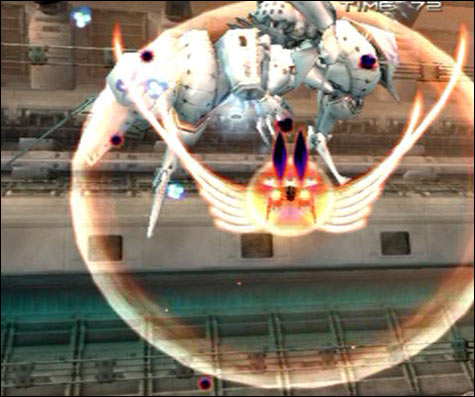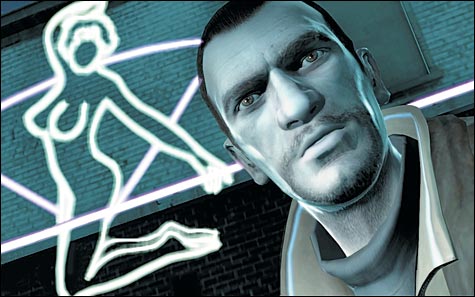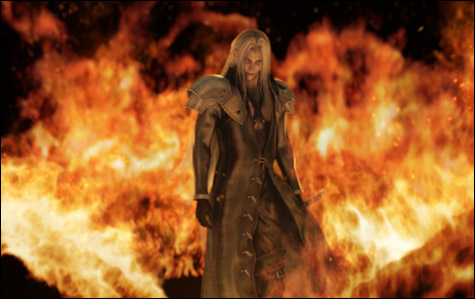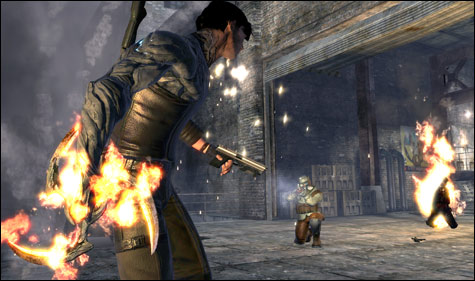I've been splitting my time recently between
Super Smash Bros. Brawl and
Crisis Core: Final Fantasy VII. The two games couldn't have less in common, except for one thing: they both tap into a deep well of nostalgia as an implicit part of the gameplay. These aren't your typical sequels or spin-offs. Unless you had some prior emotional attachment to the source material, it's likely that these games wouldn't make any sense to you at all.
Smash Bros. draws on well over two decades of some of the most popular and enduring gaming franchises around, from
Donkey Kong through
Pikmin. For those of us of a certain age in the early 1990s, the question of who would win a fight between Mario and Sonic the Hedgehog was a matter of grave import. Now, we can finally learn the answer. Hell, if you've ever played a video game in your life, you've probably spent time with more than one of the
Smash Bros. roster. The whole experience of playing it is like being on a runaway train through nostalgia country.
But here's the thing I don't get about
Smash Bros.'s popularity: The game is
terrible.
 Above: Your childhood memories exploited like the Brazilian rainforest.
Above: Your childhood memories exploited like the Brazilian rainforest.
I have never had fun with a Smash Bros. game in my life. Mostly, that's because the weird, floaty controls sometimes make me wonder if I'm commanding the right character. (I will grant the possibility that with four combatants onscreen, I often am trying to command the wrong character.) Now they've added a crappy adventure mode called The Subspace Emissary, and it is such a lousy example of platforming that I would have stopped playing it after about half an hour if beating it weren't the only way to unlock several major characters. The controls just aren't made for precision jumping and environmental navigation, and with few exceptions the levels are repetitive and boring.
The Subspace Emissary, to its credit, doesn't really try to hide that it's just playing you like a fiddle. There's a story that makes no sense -- something about all the evil Nintendo characters trying to turn the good Nintendo characters into trophies -- but it's all just an excuse to burn through the cultural capital Nintendo has built up over the years. I'm reminded of when a heel pro wrestler gets on the microphone and insults the city he's in, just to score some easy boos. Smash Bros. is one cheap pop after another:
Look! It's Link, from The Legend of Zelda!
*Cheers*
Look, it's King Dedede!
*Boos*
Considering that Nintendo has been coasting on its major franchises in this generation, all Smash Bros. does for me is remind me that there was a time when these characters and their accompanying motifs meant I was in for a wonderful time. For all Nintendo's innovation on the hardware side with the Wii, Twilight Princess and Metroid Prime 3 were only more of the same, with a slightly different control scheme (in fairness, Super Mario Galaxy did innovate to a greater degree). And that's the case here.
Nintendo is banking, literally, on the fact that millions of people already know and love these characters. Obviously, if you like the game to begin with, this will strike you as no problem. For me, I can't help but feel like Nintendo's exploiting their most valuable properties -- or they're exploiting me.
Crisis Core similarly looks to the past for inspiration. It's a prequel to one of the grandest achievements in the gaming canon, Final Fantasy VII . But it does something Smash Bros. fails to do, and that's add to the original game instead of just strip-mining it for its vast, revenue-producing resources.
 Above: Sustainable, long-term nostalgia farming.
Above: Sustainable, long-term nostalgia farming.
Admittedly, I didn't approach Crisis Core with quite the level of built-in love for its source material as I had for some of the characters and settings in Smash Bros. (Metal Gear Solid and Metroid in particular). I played FFVII only once and loved it, but couldn't give you a detailed synopsis of the story, or the exact materia combination I used to vanquish the Ruby and Emerald Weapons. Still, the last time I played one of these FFVII spin-offs, I think I was doubly disappointed that it wasn't just a bad game -- it was a bad FFVII game.
Well, Crisis Core is a good game. A very good game. It succeeds on its own merits, as a stripped-down, portable RPG. The gameplay reminds me more of Final Fantasy X than VII -- there's no overworld screen, and your character, Zack, travels from one locale to the next essentially on rails. Zack fights battles on his own in a nearly real-time manner. Although you can queue up Zack's next action -- attack, cast a spell, use an item -- you can also guard or evade an enemy's attack at any time. Doing so uses up Action Points, which are analagous to Hit Points and Magic Points, so it's not always the best idea. It helps to streamline the gameplay, while still maintaining that basic Final Fantasy feel.
The Final Fantasy VII connection isn't the crux of Crisis Core's appeal, but it does serve to flesh out the universe and deepen the fanbase's understanding of the events of FFVII. In the original game, Zack was a character seen in flashback. He was integral to the narrative, but only in backstory. Crisis Core puts him center stage. The game essentially is that cutscene blown up to full size.
Consider how well-known characters are used. Sephiroth doesn't just pop up in a cheap cameo, like Frank Sinatra in Around the World in 80 Days. We knew, from Final Fantasy VII, what Sephiroth had done. We didn't understand why. Crisis Core fills in that picture. And in the hero, Zack, we have an inversion of the usual alienated Final Fantasy protagonist. Zack starts off as the idealistic company man, and grows disillusioned as the reality of Shinra and the SOLDIER program becomes clear to him. If you draw a line from Zack's naivete through Cloud's nihilism and his eventual redemption, you'll come up with something like a circle.
In both cases, the callbacks and references to games we already knew and loved work best when they're used as a spice, and not as the main course. Although millions of gamers genuinely enjoy the Smash Bros. gameplay, and a small minority even make money on it in competition, the latest installment strikes me as a bloated, aging rock band playing all its old hits. Nothing about it adds to our appreciation of the source material.
By contrast, Crisis Core crackles with vitality. Instead of reminding me what it felt like to play Final Fantasy VII for the first time, it's giving me something more valuable for the future: memories of what it felt like the first time I played Crisis Core.
 Remember the days when you brought a new game home, loaded it into your console, and then immediately started playing? Sure, NES games sometimes needed a little goosing to get them going, but in the 16-bit age we hit a sweet spot where games always worked, and they worked quickly. Even cartridges stacked with 24 huge megs of memory started up instantaneously.
Remember the days when you brought a new game home, loaded it into your console, and then immediately started playing? Sure, NES games sometimes needed a little goosing to get them going, but in the 16-bit age we hit a sweet spot where games always worked, and they worked quickly. Even cartridges stacked with 24 huge megs of memory started up instantaneously.









